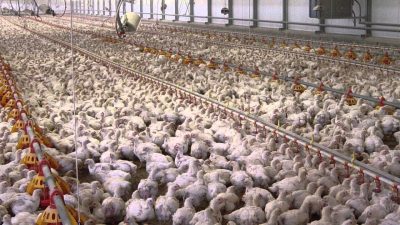Not all vaccines prevent infection. Some, known as leaky vaccines, prolong host survival or reduce disease symptoms without preventing viral replication and transmission. Although leaky vaccines provide anti-disease benefits to vaccinated individuals, new research by CIDD’s Andrew Read, David Kennedy and colleagues at the Avian Oncogenic Virus Group in the United Kingdom, and The University of New England in Australia, has demonstrated that leaky vaccines can make the situation for unvaccinated individuals worse. Leaky vaccines work by enhancing host immunity to a particular pathogen, without necessarily blocking or slowing viral replication. The result is that infected but vaccinated individuals have extended survival, allowing highly virulent pathogen that would normally reach an evolutionary dead-end in a dead host, can transmit. The evolutionary consequences of high virulence are thus reduced and these pathogens can be selectively favored as a result of leaky vaccination.
The researchers tested whether leaky vaccines could be a potential driver in the evolution of higher virulence in a system where evolution to high virulence of a virus infecting chickens has been rapidly observed since the introduction of vaccines in the 1980s. The virus known as Marek’s disease virus, infects chickens worldwide, and with its climbing levels of virulence has been costing the industry over $2 billion/year in recent years. Using an experimental setup to infect vaccinated and unvaccinated birds with viruses of different levels of virulence, Read and colleagues found that although vaccines reduced the concentration of virus shed by birds, by extending survival, vaccinated individuals shed cumulatively higher amounts of highly virulent virus. Similar results came from individuals that received maternal antibodies: immunity extended survival and increased the amount of the most virulent virus that could then be transmitted to unvaccinated individuals. These highly virulent strains that survived in vaccinated or immune-protected individuals were then shown to be lethal in unvaccinated individuals. The results suggest that disease interventions that aim to prevent disease symptoms without preventing transmission can have dangerous evolutionary consequences and need to be considered in cases with imperfect vaccines. The findings were published this month in PLoS Biology and can be accessed here. The video press release is also available here.
Synopsis written by Jo Ohm.
Publication Details
Read AF, Baigent SJ, Powers C, Kgosana LB, Blackwell L, Smith LP, Kennedy DA, Walkden-Brown SW, & Nair VK
Imperfect vaccines can enhance the transmission of highly virulent pathogens
Journal: PLoS Biology

